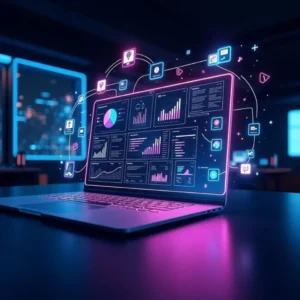How is AI Transforming Digital Marketing in 2025?

In 2025, the relationship between artificial intelligence (AI) and digital marketing is no longer experimental or optional it has become foundational. The ways in which brands connect with their audience have been completely reshaped by automation, machine learning, and predictive analytics. As the digital landscape continues to evolve, businesses that embrace AI are not just gaining a competitive edge; they are defining the future of marketing itself.
AI today is integrated into nearly every aspect of a consumer’s online experience. From the moment a person searches for a product, clicks on an ad, interacts with a chatbot, or scrolls through a social feed, intelligent systems are working quietly behind the scenes observing, adapting, and delivering content that feels increasingly personal and relevant.
One of the most significant transformations has been in personalization. In earlier years, personalization meant inserting a user’s first name into an email or recommending products based on a previous purchase. By 2025, personalization has evolved into a proactive and dynamic capability. AI systems are now capable of analyzing a user’s behavior in real time tracking actions like what they hover on, the duration they watch a video, and even the sentiment behind their comments. and tailor content accordingly. Whether it’s a perfectly timed email offer or a customized landing page, the user journey is now a deeply individualized experience powered by data-driven intelligence.
Handling this extent of personalization manually would be practically unmanageable. With AI, brands can automate content decisions across thousands even millions of users, in a matter of seconds. These capabilities have not only made marketing more efficient but have also redefined customer expectations. People now anticipate immediate, intelligent responses from brands, and businesses are rising to meet those demands with the help of AI tools that learn and improve with every interaction.
AI has fundamentally transformed both how content is produced and how audiences engage with it. Natural language processing (NLP) tools can now write product descriptions, blog articles, social captions, and ad headlines that are nearly indistinguishable from those written by a human. While these tools don’t replace human creativity, they serve as powerful assistants, reducing production time and freeing marketers to focus on strategic storytelling. Moreover, AI tools are now capable of curating content in real time identifying trending topics, analyzing competitors, and even suggesting what type of media (text, video, infographic) will best perform for a given audience.
In search engine optimization (SEO), AI has shifted the focus from keyword stuffing to understanding context and user intent. In 2025, Google’s search algorithm, powered by sophisticated deep learning technology, prioritizes content that genuinely meets user needs and provides substantial value. Smart marketers now build authority by creating content clusters, improving page experience, and structuring their sites to help both users and algorithms navigate efficiently. AI also plays a growing role in voice search optimization, enabling marketers to prepare content in the same way people naturally speak, which is vital as voice assistant usage continues to rise globally.
Advertising, too, has been transformed. With the advancement of AI, programmatic advertising the automated process of buying and placing ads has achieved unprecedented levels of sophistication. Instead of targeting broad audience segments, ads are now placed based on micro intentions, behavior signals, and environmental factors such as time of day or weather. AI systems can make decisions in milliseconds, choosing the best creative, adjusting the bid amount, and selecting the ideal platform all without human involvement.
Customer service has seen one of the most visible transformations. AI-powered chatbots have advanced well beyond merely addressing simple questions. They now conduct meaningful conversations, solve complex issues, and provide personalized recommendations all in real time. They understand tone, language variations, and even mood, helping brands maintain a high standard of service while reducing operational costs.
Perhaps the most strategic benefit of AI in digital marketing is its ability to provide actionable insights. Marketers no longer have to sift through endless spreadsheets to understand what’s working. AI tools are now capable of analyzing campaign data, identifying patterns, and providing predictive recommendations to inform decision-making. These insights help brands stay ahead by predicting trends, spotting growth opportunities, and refining strategies before issues arise.
While AI is remarkably powerful, it’s essential to recognize that it doesn’t replace human marketers it enhances and amplifies their abilities. Real marketing success still it depends on empathy, intuition, and creativity.
As a Digital Marketing Freelancer in Kollam, I have witnessed first-hand how businesses of all sizes can unlock the power of AI to grow smarter and faster in the digital space. By incorporating intelligent systems into your SEO, advertising, content, and customer engagement efforts, you’re not simply staying current you’re setting the pace.
In the end, AI is not replacing marketers. It’s equipping them with super powers. In 2025, marketers who embrace change won’t merely survive they’ll redefine the benchmarks of success in the digital landscape.